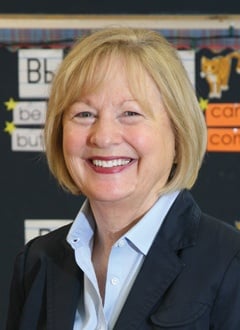
We can't permanently isolate ourselves from difficulty and neither can children, so we maintain practices that focus on instilling children's agency throughout the day. We might start with "Why aren't things going right for this child?" but we'll improve the situation only when we take action, and work to place children in learning situations where they have daily opportunities to develop agency both as learners and as whole people.
 Children come to understand that difficulty is normal, that there are strategies they know and can use to address difficulty, and that they can overcome difficulty through effort. Not perfectly, but successfully. We get into trouble when we are so eager for students’ success that we eliminate opportunities for struggle. When we do that, we’re not being honest, we’re sending the message that they can passively glide through their learning, learning should be easy, and smart people don’t fail or struggle. Then children become disengaged because they know something’s not right. They think that we don’t believe they have what it takes to be successful. And even if they actually do the work, there’s no satisfaction in it.
Children come to understand that difficulty is normal, that there are strategies they know and can use to address difficulty, and that they can overcome difficulty through effort. Not perfectly, but successfully. We get into trouble when we are so eager for students’ success that we eliminate opportunities for struggle. When we do that, we’re not being honest, we’re sending the message that they can passively glide through their learning, learning should be easy, and smart people don’t fail or struggle. Then children become disengaged because they know something’s not right. They think that we don’t believe they have what it takes to be successful. And even if they actually do the work, there’s no satisfaction in it.
Our intentions are pure—we don’t want children to become disheartened if something doesn’t work. But that disheartenment can be a good thing—it can help us guide the child into another way of figuring things out. We say, “That strategy wasn’t quite right for you this time, was it? Let’s think. What else might you try?” If they’re stuck, we offer a suggestion or two. In time they’ll learn to become metacognitive about their own engagement in learning
and take action. They’ll come to understand that when things go awry, it’s a natural consequence of learning and not a big deal. They learn to try something else and keep going.
What happens if we under scaffold a child and he’s not successful? We work with the child to fix it. Everyone—every child in our readers’ workshop, every teacher, every adult, every human—fails and is disengaged at some point. We need to expect (and appreciate!) this, and our behavior— the way we respond to children when it happens—has to demonstrate that.
•••
Connect with other educators in the Facebook Group!
 Follow us on Instagram @heinemannpub to stay up to date on the latest books, your favorite authors, and upcoming events!
Follow us on Instagram @heinemannpub to stay up to date on the latest books, your favorite authors, and upcoming events!

Debbie Miller is a teacher, author, and literacy consultant. She taught in the Denver Public Schools for thirty years and now works extensively with schools and districts on long-range planning and development of literacy programs. Debbie is the author or co-author of many resources for teachers, including Reading with Meaning, No More Independent Reading Without Support, and the forthcoming What's the Best That Could Happen?
Follow Debbie on Twitter @millerread




